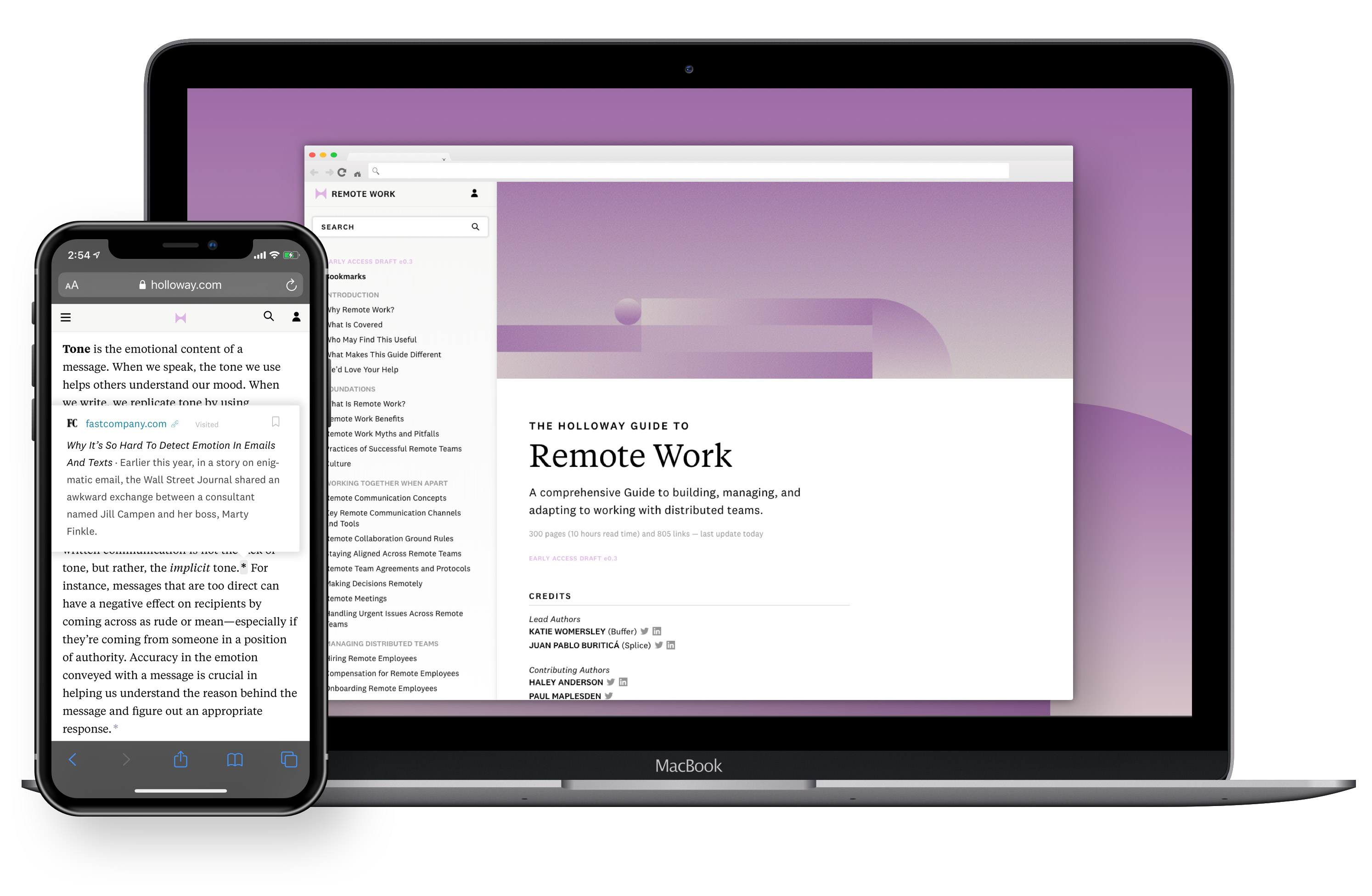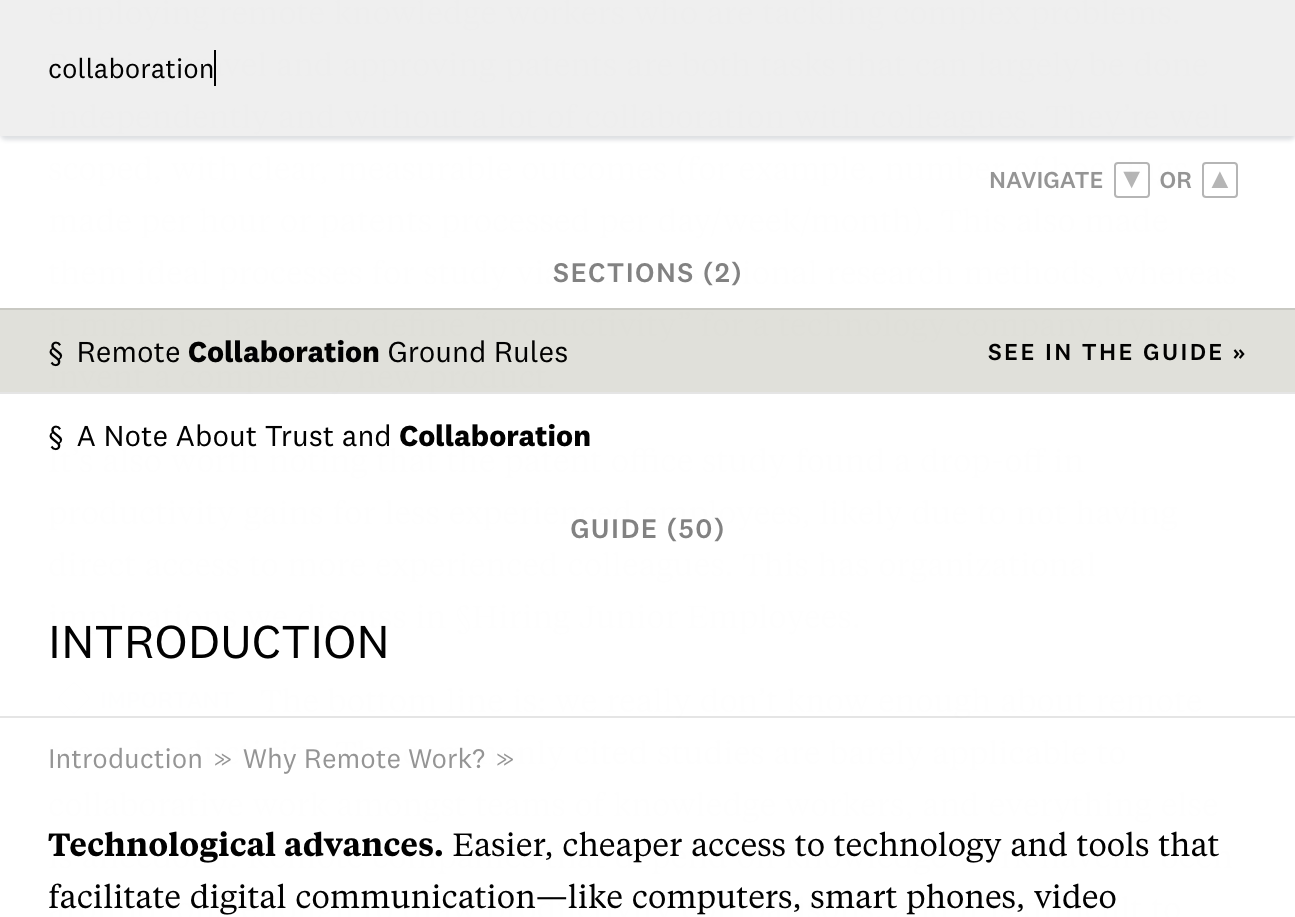Improve the way you work together—even when you're apart.
A comprehensive guide to building, managing, and adapting to work in distributed teams.
- 330-page online book
- 832+links and references
- Digital access to this title in the Holloway Reader
- Downloadable PDF for personal offline use
Everyone should have access to expert knowledge.
Companies are increasingly struggling to afford office space and hire and pay talented employees in expensive cities. More and more, employees want flexibility and choice in their work—to be near family, to be rid of time-consuming commutes, to have lower costs of living. These operating costs and hiring pressures—paired with an explosion of in-home broadband access, smart phones, and cloud-based tools—make remote work an intriguing option for a growing number of companies. But anyone who has spent enough time working remotely knows that it is an ongoing and dynamic series of tradeoffs for everyone involved.
Luckily, the people contributing to this guide have been involved in remote work for over a decade. We’ve been at large companies with work-from-home policies, hybrid companies navigating the complex interactions of offices and remote employees, to all-remote startups that don’t have any offices. We’ve seen how remote work can unblock hiring obstacles, save money, and provide employees with more satisfying, meaningful, and healthy careers. We’ve also seen dysfunctions in nearly every domain, from treating remote work as a privilege for a select set of people, to isolated, burnt-out workers left to their own devices. Those trying to build effective remote teams can benefit from these experiences, and avoid costly mistakes.
The lead authors of this guide, Juan Pablo Buriticá and Katie Wilde, lead large distributed engineering teams at fast-growing startups (Splice and Buffer, respectively). Additional contributors include Andreas Klinger (Angel List), Job van der Voort (Remote.com), Hiten Shah (FYI), Brenna Loury (Doist), Laurel Farrer (Distribute Consulting), and many more. We cover practices at companies like GitLab, Trello, Zapier, and many more, with the goals of helping managers design what works best for their company and employees, and helping employees make the most of their remote experience.
We believe remote work is a viable and important element of modern work that stands to reshape significant aspects of how companies, employees, and economies function. With the right foundations and practice, companies and employees can approach this complex, ever-changing landscape with knowledge and confidence.
Table of Contents
Researched, written, and edited by experts.
Written by practitioners. Edited by professionals.
Read with Holloway
We believe in a reading experience that goes beyond paper or e-books. Reading on Holloway means a distraction-free, interactive format to help you find what you need, when you need it, in your browser. Digital access means access to additional digital resources, future updates, curated commentary from experts and readers, and features like search and bookmarks.

Definitions of Key Terms
Powerful Search Features

Pitfalls and Confusions Explained
dangerWhen thinking about remote work, both startups and larger companies often look to other, often famous, companies for inspiration. But you are (probably) not GitLab or Basecamp, and “just use the GitLab handbook” can be inappropriate advice. The approach to remote work that you want is not necessarily the same. Each company’s size, growth, philosophies, and financial outlook may be very different from those of other companies. And if you’re an employee, one company’s handbook or philosophy won’t necessarily help you succeed elsewhere. We can learn a lot from seemingly successful remote companies, but we shouldn’t blindly copy them.
confusionTerminology about remote work is fraught with debate and inconsistency. Despite the fact that there’s a growing movement behind using the term distributed over remote—notably, viewing team members as remote can have hierarchical implications about what is “central” and what is not—for the purposes of this guide we will use “remote work” throughout to refer to the broad category, and draw distinctions about fully distributed companies or teams when relevant.
Visual Presentations

Why pay for an online book?
At Holloway, we imagine a place on the web where depth, quality, and high-value writing are the norm. A place where experts’ ideas are accessible to anyone. Where thoughtful, inclusive, and well-written resources win over quick takes, self-promoting blog posts, and content marketing.
We believe you, the reader, know the difference. It’s the 2020s. You recognize sites riddled with ads and clickbait headlines. Deep and comprehensive resources take expertise, time, and money to build. By buying access to this title, you’re supporting a place online that makes longform reading a pleasure—and allowing us to pay authors, contributors, engineers, and editors who build and improve them. Holloway is a new and powerful way to publish. We hope you’ll join us on the journey.
Does this sound like you?
- I’m worried my team won’t work well together if they’re not all in the same office.
- I want to hire someone in another country, and I have no idea what that entails. Where do I start?
- I’ve heard remote teams have to write everything down. Is that true? How would we get any other work done?
- I’ve read blog posts saying companies that are entirely remote do better. Should we ditch the office and have the entire company be distributed?
- How do people handle time-zone differences in remote teams?
- What tools do remote teams use for tracking projects or collaborating?
Frequently Asked Questions
What exactly am I buying?
By purchasing a title on Holloway.com, you get full digital access to the book and all other resources that come with it, for unlimited use by you. That means you get lifetime access online for that title on the web, using the Holloway Reader. In contrast with Kindle and other ebooks, this also includes future updates from the author or editors. Finally, depending on the title, you get additional digital resources like PDF downloads, documents, spreadsheets, or audio clips! If you purchase a bundle, you get all additional resources for each title in the bundle.
What is the Holloway Reader?
The Holloway Reader lets you read and engage with books bought on Holloway. Many of our readers call it the best reading experience for books on the web—you use it right in your browser, on desktop or mobile. In contrast to ebooks and paper books, online content in the Holloway Reader is always up to date, including updates when changes to the content are made, like responses to reader questions, new data, or new developments. It also lets us experiment with what the future of the book should look like, offering features you won’t find in Kindle or Apple Books.* It includes expert commentary in the margins and offers bookmarks and highlights, instant definitions of technical terms from a glossary, instant previews of links and footnotes, and a powerful search capability only available on Holloway titles—and we have a lot more on the way.
Are there any discounts?
We do offer discounts if you select a bundle or more than one title during checkout. We also offer student discounts to individuals with a valid .edu email address.* Before a book is released, it is available for pre-order at a discount. By pre-ordering a title, you’re supporting us and our authors in their work and you may get a note from the author, early access, or other perks.
Finally, if you sign up on our email list, in addition to excerpts and updates about our titles you’ll get any occasional special offers (infrequently—we don’t want to spam folks!).
Can I buy Holloway titles as a gift?
Yes! You can purchase and instantly share lifetime digital access for any title in the catalog. You can do this for a friend or a small group by selecting the number of invites you want to purchase during checkout. You’ll also get a receipt, so you may easily expense it if it’s a business purchase.
Can I buy Holloway titles for my team or my company?
Yes! It’s just like a gift for a few people, as above. For example, if you purchase 5 invites, you can forward the invite link or invitation email to the 5 people on your team.
We also offer additional options for team access for companies, groups, and classes. Use the team access form (just 3 questions) to set this up and get full pricing information or contact sales@holloway.com.
I have more questions!
Don’t we all. Check the full FAQ. And we’d love to hear from you at hello@holloway.com.